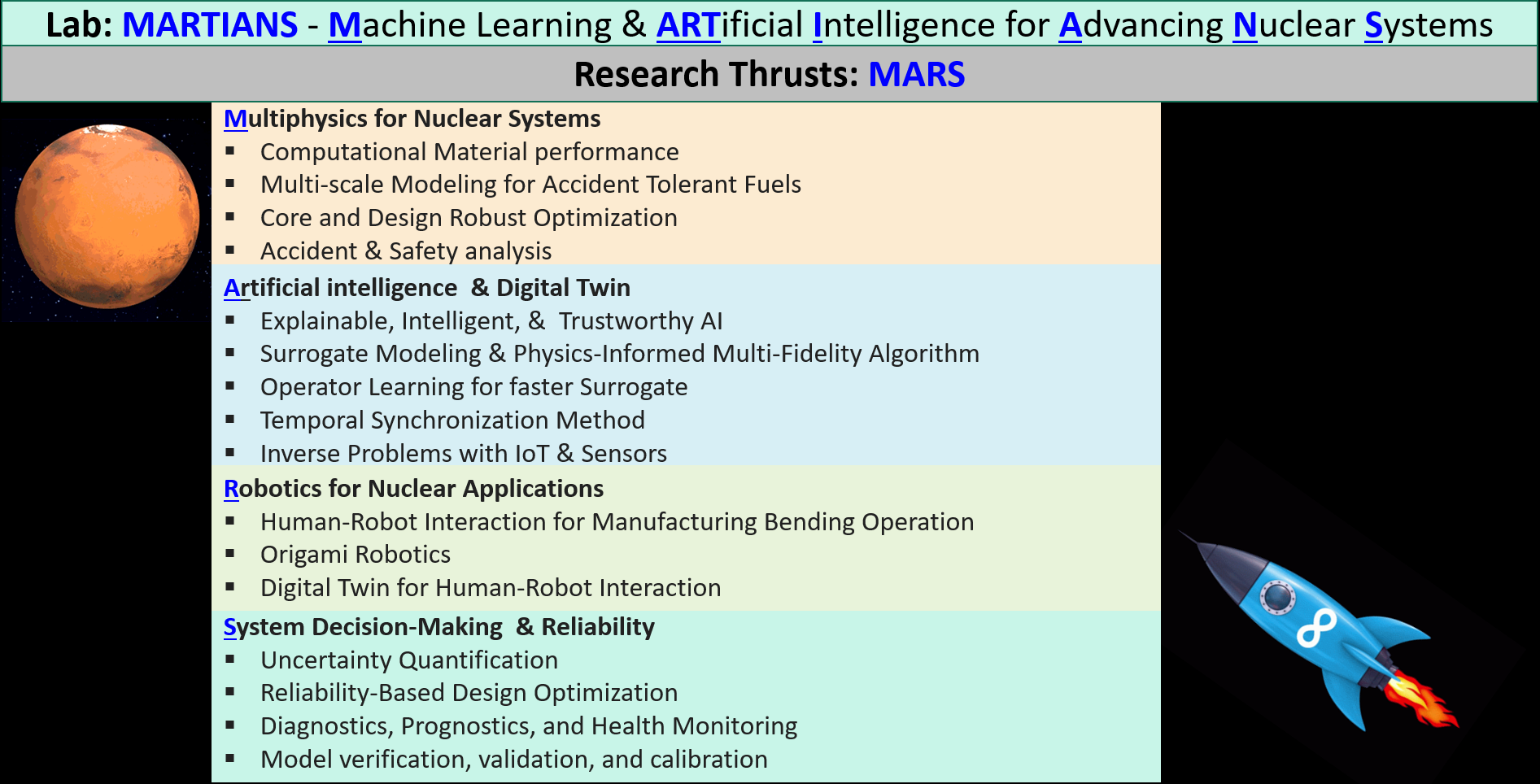
Welcome to Dr. Syed Alam‘s (Dr. Syed Bahauddin Alam) MARTIANS (Machine Learning and ARTIficial Intelligence for Advancing Nuclear Systems) Laboratory.
Principal Investigator’s Bio:

Dr. Syed Bahauddin Alam (Syed Alam) is an Assistant Professor of the Nuclear, Plasma & Radiological Engineering department at the University of Illinois Urbana-Champaign. He has been appointed as one of 11 National Committee Members on Foundation Models for Scientific Discovery and Innovation: Opportunities Across the Department of Energy at the National Academies of Sciences, Engineering, and Medicine (NASEM). He has also been selected/invited as one of ~100 Select Leaders by the Simons Foundation (Flatiron Institute with Princeton University and New York University) to bring leaders and enablers of Foundation Models (FM) for Science together from across the globe. He has also been featured in the Illinois Grainger “Top of Mind” in 2024 and 2025. For his seminal contribution in AI and Digital Twins for Nuclear Power Systems, Dr. Alam received the Dean’s Award for Excellence in Research, assistant professor level, from the UIUC Grainger College of Engineering in 2025. For his research on AI and digital twins, he was one of the top three finalists for the Illinois Innovation Award 2024 for excellence in cutting-edge innovation or translational research that addresses real-world problems and has the potential to make a significant impact. Dr. Alam has been named as a national AI leader and expert in UIUC’s official institutional response to the White House Request for Information on the U.S. National Artificial Intelligence (AI) Action Plan (2025). His Nature Portfolio-published research on AI-powered digital twins for nuclear systems attracted extensive national and international media coverage featured by over twenty global major news outlets, including American Association for the Advancement of Science (AAAS/Science Magazine/EurekAlert), Microsoft Network, Ground News, Quantum Zeitgeist, LeBigData (France), EYE Magazine, Interesting Engineering, Innovant.fr (France), Scienze Notizie (Italy), Enerzine.com (France) and so on. The research also ranked in the top 5% of all research outputs scored by Nature Altmetric globally.
Dr. Alam received several Awards and Honors for his research and teaching. He received the Outstanding Teaching Award for two consecutive years, 2021 and 2022, in recognition of notable contributions to teaching and commitment to the students by Missouri S&T in 2021. He was awarded the Most Exemplary Graduate Fellow Award on “Nuclear Nonproliferation Fellowship 2017” by the Korea Advanced Institute of Science & Tech (KAIST). He was also the winner of the ANS Best Student Paper Award in recognition of the “Exceptional Quality of the Paper” (ICAPP 2016), Nominated for the Young Generation/Student Award for Outstanding Paper (ICAPP 2017), and ANS Best Technical Poster Award (NURETH-16). For the continuation of an exceptionally promising piece of research beyond the usual standard of the PhD, he was also awarded the Cambridge Philosophical Society “Research Studentships Award” (2017) during his Ph.D. at Cambridge University.
Dr. Alam received Ph.D. in Nuclear Engineering from the University of Cambridge. He also completed his MPhil in Nuclear Energy from the University of Cambridge. He received his B.Sc. in Electrical and Electronic Engineering from the Bangladesh University of Engineering and Technology (BUET). He worked in different parts of the world. He was a Researcher at the French Atomic Energy Commission (France). He worked as a MeV Fellow at Argonne National Laboratory (USA) and a Nonproliferation Fellow at the Korea Advanced Institute of Science and Technology (South Korea).
The overarching Research Theme of Dr. Alam’s MARTIANS Lab is “Hybrid Data+Physics-Driven & Explainable Machine Learning Techniques and Multiscale Modeling with Surrogate-Modeling-Based Uncertainty Quantification and Robust Optimization for Multi-Criteria Decision-making for Nuclear Engineering Problems.” Dr. Alam’s research interests and expertise broadly lie in the intersection of nuclear engineering, explainable machine learning, mechanics & materials — focusing on data-driven analysis that warrants frequent excursions among the boundaries of applied mathematics and data science.
Principal Investigator’s Experiences:
- University of Illinois Urbana-Champaign (Current Appointment)
- Assistant Professor of Nuclear, Plasma & Radiological Engineering
- Projects – Leading MARTIANS (Machine Learning and ARTificial Intelligence for Advancing Nuclear Systems) Lab. Please see the Research Highlights
- Missouri University of Science and Technology (Current Appointment)
- Assistant Professor of Nuclear Engineering and Radiation Science
- Projects – Leading MARTIANS (Machine Learning and ARTificial Intelligence for Advancing Nuclear Systems) Lab. Please see the Research Highlights.
- French Atomic Energy Commission (Feb 2018 to Jan 2019)
- Postdoc
- Project – Gamma Heating for Fast Reactor
- Rhode Island Atomic Energy Commission (Apr 2016 – Present)
- Visiting Scholar
- Project – Oxidation Behavior and Radiation Effects of Silicon Carbide
- University of Cambridge (Jan 2014 to Jan 2018)
- Graduate Research Student, Department of Engineering
- Project – Reactor Core Design for Marine Propulsion
- Korea Advanced Institute of Science and Technology (Jul 2017 to Aug 2017)
- Nonproliferation Fellow, KAIST Nonproliferation Education & Research Center
- Argonne National Laboratory (Jun 2018)
- Modeling, Experimentation and Validation (MEV) Fellow, Lemont, IL, USA
- Project – Artificial Intelligence for Robust Reactor System Design
- University of Cambridge (Oct 2012 to Sep 2013)
- Graduate Master’s Research Student, Cambridge Nuclear Energy Centre
- Project – Modeling of the Reduced-Moderation Water Reactor Fuel Assembly
Wanna learn more about him? Please continue browsing then 🙂
MARTIANS Lab

Forest.
Even a child knows how valuable the forest is. The fresh, breathtaking smell of trees. Echoing birds flying above that dense magnitude. A stable climate, a sustainable diverse life and a source of culture. Yet, forests and other ecosystems hang in the balance, threatened to become croplands, pasture, and plantations.